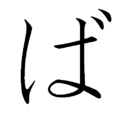ば
 | ||||||||||
| ||||||||||
Japanese
| Stroke order | |||
|---|---|---|---|
See also
Etymology 2
Etymology 3
Particle
ば (rōmaji -ba)
- Attaches to the 仮定形 (kateikei, “hypothetical stem”) in modern Japanese, or to the 未然形 (mizenkei, “irrealis or incomplete stem”) in Classical Japanese, to form the hypothetical conditional: if; when
- 2007, yura (lyrics), 神前暁 (music), “キラメキラリ”, in THE IDOLM@STER MASTER ARTIST 02 高槻やよい:
- 宇宙から見れば地球も流れ星
- uchū kara mireba chikyū mo nagareboshi
- If you see from the universe the earth is also a shooting star
- 宇宙から見れば地球も流れ星
- 私はあなたが隣に居てくれればそれで幸せなの!
- Watashi wa anata ga tonari ni ite kurereba sore de shiawase nano!
- I'll be happy as long as you are by my side.
-
- (used with ほど) the more ..., the more
- 学べば学ぶほど、何も知らなかった事に気づく
- Manabeba manabu hodo, nani mo shiranakatta koto ni kizuku
- The more I learned, the more I felt I didn't know anything.
- 学べば学ぶほど、何も知らなかった事に気づく
- (used with も) Links items in parallel; ... and ...
- 日本語もできれば英語もできる
- nihongo mo dekireba eigo mo dekiru
- to be able to speak both Japanese and English
- 日本語もできれば英語もできる
- (Classical Japanese) Attaches to the 已然形 (izenkei, “realis stem”) to form the provisional: as
- c. late 9th – mid-10th century, Taketori Monogatari
- それを見れば、三寸ばかりなる人いと美しうて居たり。
- Sore o mireba, sansun bakari naru hito ito utsukushūte itari.
- When he looked at it, there sat a very lovely human being about three sun long.
- それを見れば、三寸ばかりなる人いと美しうて居たり。
- c. late 9th – mid-10th century, Taketori Monogatari
Usage notes
- The hypothetical conditional is formed by attaching ば (ba) to the 仮定形 of a verb or adjective in modern Japanese. This is done to the 未然形 in classical Japanese, which persists in a few set phrases like ならば (nara ba) and 例えば (tatoeba) in modern Japanese.
- There is also 已然形 + ば in classical Japanese, which looks like 仮定形 + ば in modern Japanese, but introduces something occurred as a cause, occasion or circumstance.
This article is issued from
Wiktionary.
The text is licensed under Creative
Commons - Attribution - Sharealike.
Additional terms may apply for the media files.